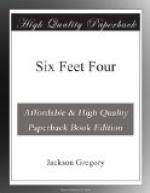The girl was Henry Pollard’s niece. He began with that fact. She was on her way to Pollard’s and on an errand which the banker Templeton had called mad and dangerous. Some man had followed her, a man whom she had twice seen on the trail and whose outfit resembled Thornton’s, resembled it too closely to be the result of chance! The same headstall with the red tassel, the same grey neck-handkerchief, a sorrel horse....
“By God!” whispered the cowboy, a sudden light in his eyes, “he lamed my horse so it would limp the same as his! So she’d be sure she had seen me on the trail behind her! And when she came out and saw my horse limping she knew I had lied to her!”
But why? Why? What lay back of all this?
In the end he put out the light, slipped the spur rowel into his vest pocket, and went out to his horse. Then when an hour’s search brought him no nearer to the hidden truth for which he was groping, he gave up trying to pick up this other man’s trail in the rocky soil about Harte’s place and turned back toward the south-east and his own ranch.
“I’m going to have a talk with you, Miss Grey Eyes,” he said softly. “I’ve got to give you back your spur, and I’m going to ask you some questions.”
He rode late into the night, stopped for a few hours under the stars with saddle blanket for bed, and in the dawn pushed on again.
For the few days which followed he had, in the stress of range work, little time for thought of the riddle which had been set for him to solve, and when he had time after the day’s work he was tired and ready for sleep. He was working short handed now for the very simple and not uncommon reason that he was spending no dollar which he did not have to spend. The payments he had already made to Pollard had been heavy for him, and there was yet another five thousand dollars to be forthcoming in six months. The contract was clear upon the point, and he knew that if he failed to meet his obligation Henry Pollard would be vastly pleased, being in a position to keep the fifteen thousand which had been paid to him and to get his range back to boot.
Perhaps because Henry Pollard had never lived upon the ranch during the twenty years he had owned it improvements were few and poor. There was the barn, too small now, which must come down in another year; there was the old corral which was little used since Thornton had had the newer, bigger one builded. Then, for ranch house, there was a single room cabin, its walls of heavy logs from the hills at the head of the Big Little River, its door of great thick planks rough and nail studded, its roof of shakes. A hundred yards from it, at the foot of the knoll upon which the ranch house stood, was a similar cabin, a dozen feet longer, serving as the men’s bunk house.
Big Little River wound about the foot of the knoll, separating Thornton’s cabin from the bunk house, three or four feet deep here and spanned by a crude footbridge. In its windings it made a sort of horseshoe about the knoll so that looking out from the door of the cattle man’s cabin one saw the sluggish water to east, west and north.




